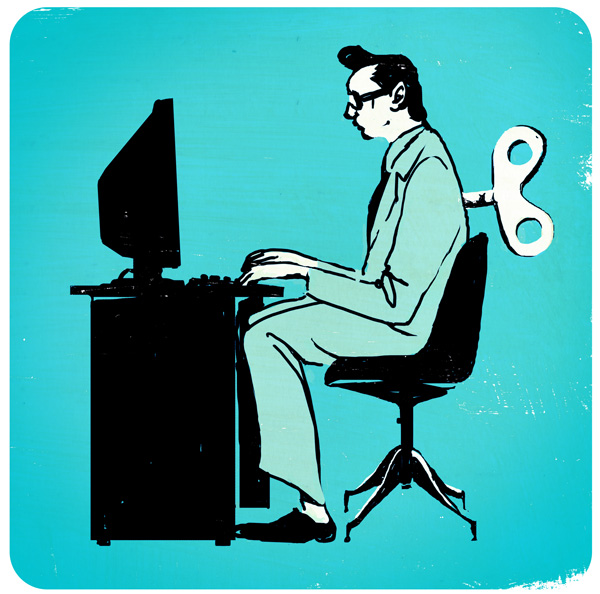According to Punchbowl.com, celebration is in order today for Workaholics Day. Few would criticize the numerous achievements and accomplishments one can achieve with the industrious spirit that is so highly prized in a multitasking culture such as ours, where we’re eager to pencil in to-do’s for every hour of our waking day. However, being a recovering workaholic myself, I can honestly say that claiming this title as the central part of your identity can frequently come at too high a price for your physical and mental health.
For one, high chronic job stress can affect our decision-making ability. According to a study reported in a 2011 issue of Neuroscience, high chronic job stress shifts cognitive strategies to more reactive, automatic decisions, or “simple and rigid habit action.” Participants were no longer able to think through flexible, goal-oriented decisions.
Physiologically, there are also key differences. In people with high chronic job stress, less activity was seen in the brain regions relating to goal-direction action, as well as less reactivity in diastolic, or resting, blood pressure.
Chronic job stress has also been strongly associated with obesity, cardiovascular disease, diabetes, muscle pain, high blood pressure, a weakened immune system, insomnia, depression and anxiety. According to a study in the British Medical Journal, men under chronic work stress were nearly twice as likely to develop metabolic syndrome than those without work stress. Women with chronic work stress were more than five times more likely to have the syndrome.
More than a third, or 36 percent, of U.S. employees said they were experiencing chronic work stress, according to a 2011 American Psychological Association survey.
Our heavy use of mobile technology has made it even easier to feel compelled to stay constantly connected, at home or at work. As of April 2012, 88 percent of American adults own a cell phone, with 55 percent using them to go online, according to a recent study by the Pew Internet & American Life Project. The convenience and reliability of a cell phone means that we can be always available, for better or for worse.
In a 2010 Pew study, 42 percent of cell phone users said they felt irritated when a call or text message interrupted them. Yet 65 percent have slept with their phones on or next to their bed, and they are just as likely to express irritation by phone disruptions.
Increasing studies are showing that taking time away from the office, including using all your vacation days, are highly beneficial for your health.
 Using information drawn from the Framingham Heart Study, which has been studying risk factors for cardiovascular disease in residents of Framingham, Mass. over 20-year-periods, researchers looked at association between heart disease and vacation frequency in 2008. Skipping even one year’s vacation was associated with an elevated risk of heart disease.
Using information drawn from the Framingham Heart Study, which has been studying risk factors for cardiovascular disease in residents of Framingham, Mass. over 20-year-periods, researchers looked at association between heart disease and vacation frequency in 2008. Skipping even one year’s vacation was associated with an elevated risk of heart disease.
The New York Times reported that women who took vacations at least twice a year were nearly eight times less likely to develop coronary heart disease or have a heart attack than those who vacationed once every six years or less, according to Elaine Eaker, a co-author of the study.
Over a nine-year span, men who skipped vacation for five consecutive years were 30 percent more likely to suffer heart attacks than were those who took at least one week off each year.
According to Psychology Today, State University of New York at Oswego researchers analyzed the Framingham data even more, discovering that men who take yearly vacations reduce their overall risk of death by approximately 20 percent and risk of death from heart disease by up to 30 percent.
In a New York Times article last week, “The ‘Busy’ Trap,” Tim Krieder praised the benefits of rest. “Idleness is not just a vacation, an indulgence or a vice; it is as indispensable to the brain as vitamin D is to the body, and deprived of it we suffer a mental affliction as disfiguring as rickets,” he wrote.
Taking time to step back and reflect on your life as a whole, Krieder suggests, allows the opportunity for “making unexpected connections and waiting for the wild summer lightning strikes of inspiration — it is, paradoxically, necessary to getting any work done.”
It was during my own period of forced reflection—after my body had literally crashed after months of burning the candle from both ends doing a job I loved—when I came to realize just how crucial balance is in one’s daily life. As long as it is not coming at the expense of other key areas for life satisfaction, there’s nothing wrong with work enthusiasm, especially when you are doing something about which you are so passionate.
Some scientists suggest that those with impassioned type of workaholism suffer less negative consequences than the classic workaholic, who is compulsively driven to put in more hours at work. According to a February article in L.A. Times, researchers at Utrecht University in the Netherlands have identified what they term “engaged workaholics,” who put in all that time and hard work because they sincerely love what they do.
“When a [classic] workaholic is not working, he feels guilty and restless,” said lead researcher Wilmar Schaufeli, professor of work and organizational psychology at Utrecht University. “To avoid those negative feelings, he starts to work. This is totally different than when you work intensely because you like the job.”
According to the Dutch researchers, classic workaholics have less job satisfaction, more conflicts at work, more dissatisfying social relationships and more heart attacks. Engaged workaholics experience much less burnout – perhaps loving what you do serves as a buffer to the negative effects of putting in too many hours at work. I know it helped fuel my body’s fire much longer than it reasonably should.
British studies suggest that the level of control one has in the workplace affects how engaged—and enjoyable—the work experience. Dr. Michael Marmot, professor of epidemiology and public health at University College London, is the principal investigator for the Whitehall Studies of British civil servants, which looks at the effects of the workplace on the health of white collar workers.
“When you have more control, the work is more interesting,” Marmot said, and engagement results.
When there is low control and high demand, Marmot’s team found, that increases stress, the risk of cardiovascular disease and poor mental health.
When your body starts giving you warning signs that you are putting in too many extra hours than what’s good for you—rather when it’s screaming at you to slow down, you need to take heed. Whatever reasons that compel you to live for the office, a healthy work-life balance is a necessity to long-term good health.
Yes, climb to the highest rungs of the ladder in your career – if that’s truly your calling. Be all those wonderful and amazing things you’ve always dreamed for yourself. But by God, don’t kill yourself in the process, please.
The Egyptian pyramids of perfection weren’t built in a day—they really weren’t. And that took teams and teams of people to do it.
Find your passion. Find your groove. And to ensure you can sustain that for the many years to come, make sure you find your balance that feeds all areas of your life, leaving room to quench the untold thirsts of your spirit.


There’s a connection between this article and the one on circumcision. Pleasure deprivation and workaholism are intimately linked via dopamine.
http://members.tranquility.net/~rwinkel/MGM/oldrefs/www.latimes.com/news/science/la-sci-workaholic12aug12.story
http://members.tranquility.net/~rwinkel/MGM/primer.html
Fascinating connection, Richard. Makes sense as dopamine helps control brain’s “pleasure center.’ Workaholism often squelches pleasure for the sake of productivity…and there are a couple different camps of thought on circumcision, pain and long-term affect on sensitivity and pleasure. Thanks so much for seeing the link and sharing these sources!
Greetings, I discovered your blog on http://themindbodyshift.
wordpress.com/2012/07/05/the-perils-of-being-a-workaholic/
while browsing for a corresponding topic, your website came up, it seems interesting.
I’ve bookmarked it in my google bookmarks.
A fellow blogger here, found your site via MODx, and I have a piece of
advice: write more. Honestly, it appears as if you depended on
the clip to make your point. It’s clear you know your stuff, so why not use your knowledge to write something more significant and keep the video as something secondary (if there at all)?
I didn’t use a video, but I agree, I should write more and not be afraid to draw from what I already know! Stats just emphasize a point. Thanks
Good post. I learn something new and challenging
on blogs I stumbleupon on a daily basis. It’s always helpful to read through articles from other
writers and use a little something from their sites.